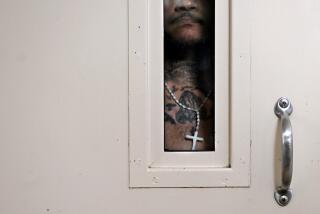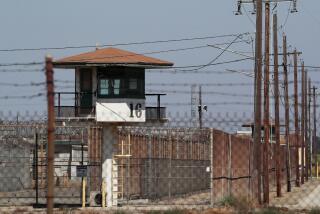Prison lawyers seek emergency order on coronavirus, including release of inmates
Lawyers for California prison inmates say the state has failed to take urgently needed steps against COVID-19 outbreaks and asked federal courts on Wednesday for an emergency order for prison releases.
They said federal intervention is needed to prevent illness and death “certain to occur if the COVID-19 virus is allowed to take its natural course in the still-overcrowded California prisons.”
The motion asks for “targeted releases” of low-risk inmates who have less than a year left to serve as well as the release or relocation of inmates who are 65 or older and those who have chronic lung disease or other medical conditions that put them at severe risk from COVID-19. The lawyers also seek steps to protect about 50,000 prisoners double-bunked in open dorms where social distancing is impossible.
The filing does not ask for a specific number of releases but enough so the prisons comply with social distancing orders Gov. Gavin Newsom has issued for all of California.
Without immediate action, the lawyers told the judicial panel overseeing California prison conditions, “COVID-19 will spread like wildfire in [the state’s] crowded prisons ... overwhelming hospital capacity and needlessly infecting thousands.”
Newsom on Tuesday ordered prison admissions be halted, but said he had “no interest in ... releasing violent criminals from our system.”
There was no immediate response by lawyers for the state.
The prison system’s most recent population study, released in January but containing 2018 demographics, shows more than 10,500 inmates age 60 or older. The court motion says 17,000 prisoners are designated medically high risk.
“We’re doing this so they have the same opportunity to survive the virus as the rest of us,” said Michael Bien, a Bay Area attorney whose firm represents mentally ill inmates in long-running prison civil rights litigation.
One inmate and nine prison employees have tested positive for COVID-19 across six prisons. The inmate was reported in stable condition at the California State Prison in Lancaster.
The Department of Corrections and Rehabilitation on Wednesday posted data showing 159 inmates to date tested for the virus, with results for 94 of those tests still pending. The biggest cluster, 32 tests, is at the state-leased California City Correctional Center in Kern County.
The prison system two weeks ago curtailed outside visitors and has reduced transfer of inmates from one prison to another.
The department has said it is bolstering its defenses with gateway screening, additional cleaning and distributing extra soap to inmates who ask for it.
“We have long-standing outbreak management plans in place to address communicable disease outbreaks such as influenza, measles, mumps, norovirus and varicella, as well as preparedness procedures to address a variety of medical emergencies and natural disasters,” the department said in a statement Tuesday.
Internal records obtained by The Times show numerous cell blocks put on quarantine, and then restrictions lifted, on a daily basis. One directive tells prison medical workers there are “severe shortages” of masks, respirators and other protective gear. They are told to consider practicing “extended use” of protective gear as they move from patient to patient.
Staff and inmate families told The Times of instances in which prison kitchens and dorms have run out of disinfectant.
California has stared down federal court orders to release inmates before, most recently in 2014 when judges deemed the state had not done enough to reduce overcrowding so severe it threatened inmates’ lives and welfare. The state’s prisons are currently operating at 134% capacity. There are about 121,400 inmates among 35 state-run prisons, as well as firefighting camps and in-state private lockups.
About 65,000 workers enter and leave prisons daily, with no more than verbal screening on whether they feel ill, have recently traveled or had contact with someone infected with COVID-19.
An early order advised wardens to prepare for temperature screening to monitor for those with fever, as was done at overseas airports early in the COVID-19 pandemic. But some staff told The Times that doesn’t happen and that workers who are sick have lied and gone into prisons.
U.S. District Judge Kimberly Mueller last week created a task force to report back on prison efforts to deal with COVID-19. Bien said the group has met almost daily, but while discussions on mental health care during the crisis are progressing, movement on a plan to reduce the risk of viral spread through the prisons has been slow and limited.
Over the last decade, California shifted lower-level offenders to county jails and made many drug and theft offenses misdemeanors in part to reduce overcrowding. The state prison system therefore now has a distilled population of serious offenders, as well as elderly inmates serving extended or life sentences.
Bien called the state’s response “the best they can do” under current policies. “At the same time, we have increased fear, anxiety, and we’re limiting mental health treatment. The state needs to do much, much more.”
More to Read
Sign up for Essential California
The most important California stories and recommendations in your inbox every morning.
You may occasionally receive promotional content from the Los Angeles Times.











